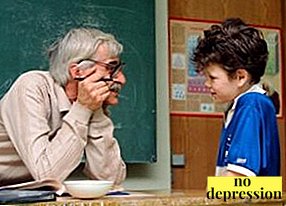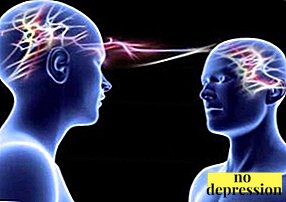An important type of communication is pedagogical communication.
This is a multi-faceted process. teacher interactions with studentshaving a number of features.
Concept: briefly

What is pedagogical communication?
Communication is a key factor in mental, social development of personality.
Only in the process of communication with adults does a child comprehend the norms of behavior, receive information about the world and about society.
The more productive the interaction with others, the more chances for implementation in person.
Not only the immediate environment in the face of parents, relatives and friends has a huge impact on the child. Teachers also play a tangible role.
Pedagogical communication - the interaction of the teacher with the student in the framework of the educational process.
This is a multi-level communication, which includes the transmission and reception of information, the occurrence of emotional reactions, mutual understanding. As a result of joint activities, the student learns new knowledge.
Psychological foundations
Pedagogical communication is an important factor influencing the socialization of the student, on his personal development. If the interaction of the parties is effective, the student acquires new skills and knowledge, self-reliance.

The teacher, in turn, is convinced of his own professional solvency, gets satisfaction from the learning process.
Negative interaction results adversely affect the psychological state of both parties: the teacher may doubt his own competence, and the student lose interest in learning.
Pedagogical communication has a threefold focus: on the interaction itself (information transfer), on students (their condition, their development), on the subject of development.
In this case, the teacher must convey information to the entire audience, take into account the characteristics of each student, focus on all the important points of the material being mastered.
The complexity is the process of building relationships with the wards. On the one hand, the pedagogical process provides business relationship.
On the other hand, a productive result can be achieved only if a psychological atmosphere is favorable for students. Accordingly, effective teacher performance implies combination of business and personal relationships.
Culture of pedagogical communication

The basis is general and pedagogical teacher personality culture.
Under the general culture is understood the level of human development, his spiritual and moral qualities, intellectual abilities.
The higher this indicator, the more a teacher can give to their wards. Pedagogical culture - is an understanding of the specifics of their professional activities aimed at raising the younger generation.
Each teacher has his own character, demeanor, style, etc. However, the culture of his behavior expressed in compliance with the following rules:
- respect for each student, regardless of personal opinion about him;
- objective assessment of students' abilities;
- consideration of the psychological characteristics of students;
- a demonstration of goodwill and openness;
- interested attitude to any point of view;
- readiness to give explanations and repeat information that was not learned the first time;
- manifestation of tolerance, understanding, participation;
- recognition of the right of the beneficiaries to have their own point of view, different from the majority opinion;
- exclusion of any threats, ridicule, humiliation of dignity, reproaches (a negative assessment may be given to the results of studies, and not specifically the personality of the student);
- the absence in the behavior of the teacher of signs of a sense of superiority in view of his position or life experience.
Functions

Pedagogical communication performs the following functions:
- Regulatory. Students receive information about the basic rules and norms of behavior, develop the ability to act in accordance with the expectations of society.
- Cognitive. Obtaining knowledge about the world, about phenomena and processes, about individual areas of science. This knowledge forms the intellectual baggage that a person has in the future.
- Emotional. In the process of learning, certain emotions are formed.
- Actualizing. Pupils in the process of acquiring knowledge, during communication with the teacher, learn their own individuality, get opportunities for self-realization and self-expression.
- Regulatory. The regulatory function of pedagogical communication is its ability to influence the behavior of students.
The educational process involves the imposition of certain duties, the application of measures of influence and control.
Structure

This type of communication consists of several successive stages:
- Prognostic. During the preparation for the implementation of teaching activities, the teacher models the upcoming communication. He proceeds from the goals and objectives that confront him in each particular case. Also influenced by the personality of the teacher, especially the audience with whom to interact. Building a forecast allows you to define a style of behavior, refresh knowledge in a particular area, prepare visual materials, if necessary, etc.
- Elementary. Acquaintance to a new audience, construction of primary dialogue with its representatives. At this point, the parties are formed first impressions based on the emotional perception of the opponent. This stage largely determines the success of not only the substantive part of the activity, but also its socio-psychological basis.
In the very first moments of working with the audience, the teacher must determine how the training model he chooses corresponds to the setting and mood of the wards.
- Communication Management. This is an immediate interaction process during which the teacher implements the strategy outlined at the prognostic stage. Depending on the response of the audience, an experienced teacher can adjust their behavior, adjusting to the specific situation. It has a speech impact on students, selects and applies various means of transmitting information, supports verbal and non-verbal contact.
- Final. Analysis of intermediate results of communication. Identification of existing problems in order to adjust the selected methods. The definition of pedagogical tasks that will be solved in the future. For the teacher, it is important to be able to objectively evaluate the results of interaction, to feel feedback from the audience. Otherwise, the effectiveness of communication and the learning process itself will be very low.

Types and types
Pedagogical communication is represented by two main types:
- Individual. Bilateral dialogue in which the teacher and a particular student participate. So, during a call to the board of one ward or during a discussion at the seminar of the report of a particular student, individual communication between the teacher and student takes place.
- Frontal. The interaction of the teacher with the entire audience at the same time. Occurs while conducting a lesson in the classroom, giving a lecture at the institute. In this case, the information is translated impersonal.
The teacher must be fully proficient in both types of communication, since the learning process almost always includes both.
Typology of pedagogical communication is very diverse. depending on those factors that are subject to analysis:
- directivity: direct, indirect;
- content: educational, sports, leisure activities;
- on purpose: spontaneous, purposeful;
- on controllability: unmanaged, partially managed, controlled;
- on the established relationship: equality, leadership;
- the nature of communication: cooperation, dialogue, custody, suppression, conflict.
- by audience reach: private, public;
- by intentions: accidental, intentional;
- by duration: long, short;
- by performance: productive, unproductive.

Teacher communication styles
Basic communication styles:
- Authoritarian. The teacher acts as a carrier of some power, which gives him credibility. The learning process is based on the existing attitudes of the teacher, attitudes and beliefs. He independently determines the strategy of actions, learning objectives, subjectively evaluates the results of interaction.
This style of behavior leads to the fact that students recognize the authority of the teacher, but do not have the opportunity to express their opinions and influence the learning process.
Often the personality of the teacher causes hostility, and his players experience various emotional experiences.
- Democratic. Cooperation of the parties, collective decision making is welcomed. The teacher and students have equal rights and opportunities. With this style of communication, the wards have more opportunities for self-realization, they feel psychological comfort during the lessons. The teacher establishes a trustful, respectful relationship with them. The democratic style of pedagogical communication is the most productive way of cooperation, which allows to get high results.
- Permissive. The teacher demonstrates a passive attitude. He does not seek to engage in interaction in the measure in which it is necessary to do this. Such behavior is due to an unconscious or conscious desire to disclaim responsibility for the results of the interaction. All participants of communication are involved by the teacher in solving common problems. Accordingly, the results also result from common efforts.
In terms of productivity, such interaction is inferior to the previous two types, but from the point of view of the psychological factor is a better option than the authoritarian style.

Specifics
Similar communication different from all other types of social interaction by the fact that one of the subjects is initially recognized as an authority, a source of knowledge, an example of compliance with important life values.

The teacher is perceived as a symbol of the culture of interpersonal relationships.
Pupils should respect his opinion, listen to him.
The purpose of the teacher's communication with the wards is not only the provision of information, but also the development of their creative skills and abilities.
It requires an individual approach that is more complex when interacting with large audiences.
Distinctive feature of communication - impossibility to avoid it for both participants of interaction.
In most cases, any unwanted communication can be reduced to a minimum — to stop a boring friendship, to part with an unloved person, quit their job, etc.
Student and teacher forced over the years to interact with each other even with persistent personal dislike.
As a result, the communication is to a certain extent compulsory and forces both parties to the extent possible and willing to adjust to the circumstances.
Therefore, pedagogical communication is an important element of the formation of personality. The effectiveness of such communication depends on the qualifications of the teacher, his ability to build relationships with students.
Pedagogical communication, as the main factor in the effective interaction of the teacher and the child:



